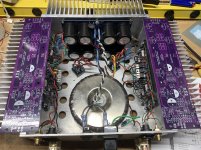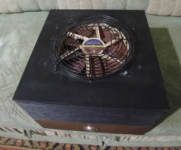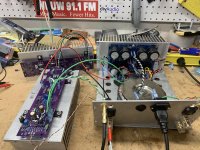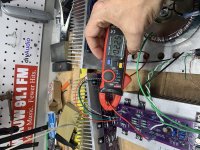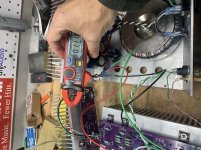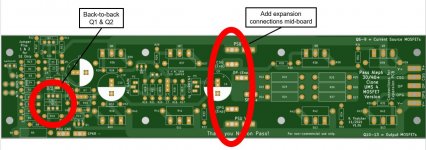Randy!
Awesomeness! I recently built the Aleph J and listened to it extensively (first few threads of my NPXP thread attached) and there is certainly something “righteous” about the Aleph topology. My first Aleph listen was the Aleph 3 as well, probably at the same time Randy and I were in the Cleveland area (my college days). But I never got to listen to the Aleph big boys like the Aleph 5 or Aleph 2.
Bring it on!
Best,
Anand.
Awesomeness! I recently built the Aleph J and listened to it extensively (first few threads of my NPXP thread attached) and there is certainly something “righteous” about the Aleph topology. My first Aleph listen was the Aleph 3 as well, probably at the same time Randy and I were in the Cleveland area (my college days). But I never got to listen to the Aleph big boys like the Aleph 5 or Aleph 2.
Bring it on!
Best,
Anand.
Fantastic, Randy!
I'm interested in a GB. Surprised no one (that I saw) chimed in re: a test build. I'd be a happy guinea pig if needed. I have some donuts and a chassis or two ready.

I'm interested in a GB. Surprised no one (that I saw) chimed in re: a test build. I'd be a happy guinea pig if needed. I have some donuts and a chassis or two ready.

I’m going to take this noisy aleph 5 Rawson chassis and make a single channel Aleph 60 test bed on my bench to prove out the concept. Stay tuned. It should happen within a week. I’m off all next week and the kids are in school Monday and Tuesday…. Dad gets tinker time…
Attachments
I run my aleph mini in my office with near field monitors and love the sound. Had planned to build a balanced A30 but there will always be other options 🙂. Great work Randy, this ageing gem deserves the limelight..dB
An excellent project. 👍🏼
For those of us with lower impedance speakers -
I wasn’t aware of this until just then
“The Aleph 3 (or 5) are optimized to run into 8 ohms”
… wasn’t disputed by Nelson. He responded
“Paralleling inputs and outputs on Alephs and Zens is
a great way to get good performance into low impedances”
Aleph (3 or 5) into 3/4 ohm
To do that, we would use two PCBs per channel, which should present no problems I would think. But please correct me if I’m wrong
For those of us with lower impedance speakers -
I wasn’t aware of this until just then
“The Aleph 3 (or 5) are optimized to run into 8 ohms”
… wasn’t disputed by Nelson. He responded
“Paralleling inputs and outputs on Alephs and Zens is
a great way to get good performance into low impedances”
Aleph (3 or 5) into 3/4 ohm
To do that, we would use two PCBs per channel, which should present no problems I would think. But please correct me if I’m wrong
What’s really great about your project is implementing the improvements which have been made along the way in the amplifier circuit…
What about the power supply - is there any particular Pass one which is considered best, or even a generic but very well regulated (and measured) power supply? I’m thinking that the better the power supply (of course, up to a point) more most of the improvements would be in bass response especially in music with a lot of drums.
What about the power supply - is there any particular Pass one which is considered best, or even a generic but very well regulated (and measured) power supply? I’m thinking that the better the power supply (of course, up to a point) more most of the improvements would be in bass response especially in music with a lot of drums.
Randy,
I just came across your improved power supply for the F5 … would that be suitable for this?
I just came across your improved power supply for the F5 … would that be suitable for this?
Randy,
I just came across your improved power supply for the F5 … would that be suitable for this?
The new F5 supply is well suited for a stereo amp.
I also made a CRCRC power supply that WG45 used in his mono Aleph 2 Rawson rebuild. There are a few tweaks I’ll do to the pads on that board. I like that for a mono build.
Both have mounting holes that fit in the 10x10 grid on the bottom plate of the store chassis.
I’ll include both boards as options when putting a group buy up this week.
for those wanting higher class A power without large expensive heatsinks, a good quiet fan or two could majorly reduce the amount of heatsinking
eg a 120 mm Noctua NF-A12x25 PWM, Premium Quiet Fan
max. 22.6 dB(A)
automatic speed control via 4-pin PWM fan headers
https://www.amazon.com/dp/B07C5VG64...abc_AQK6FTY38BKFGCNN62XB?_encoding=UTF8&psc=1
Here's an unusual Aleph 3 with a Noctua
eg a 120 mm Noctua NF-A12x25 PWM, Premium Quiet Fan
max. 22.6 dB(A)
automatic speed control via 4-pin PWM fan headers
https://www.amazon.com/dp/B07C5VG64...abc_AQK6FTY38BKFGCNN62XB?_encoding=UTF8&psc=1
Here's an unusual Aleph 3 with a Noctua
Attachments
I made a test bed Aleph 60 mono using a Rawson aleph 5 chassis to prove out the expansion from main board to a 2nd board without the front end bits populated. This was all parts bin goodies and some mosfets harvested from the aleph 5’s. Price was right!
34v rails. 2.2A per rail from psu, 1.1A on 2nd board. Load is spread evenly. I had fun and turned the current up a bit, and that worked as expected. Ac gain and offset pots were jumpered out and the spec a60 resistor values were used in the respective positions.
The amp works and sounds great on test speakers! I’ll call this experiment a success, and it unlocks the possibility to do higher power amps with these boards. Thanks again to Jim 6L6 for the idea of using the same board for expansion (as opposed to a dedicated daughter board.)
34v rails. 2.2A per rail from psu, 1.1A on 2nd board. Load is spread evenly. I had fun and turned the current up a bit, and that worked as expected. Ac gain and offset pots were jumpered out and the spec a60 resistor values were used in the respective positions.
The amp works and sounds great on test speakers! I’ll call this experiment a success, and it unlocks the possibility to do higher power amps with these boards. Thanks again to Jim 6L6 for the idea of using the same board for expansion (as opposed to a dedicated daughter board.)
Attachments
Group Buy Link is active. See this thread: Classic Aleph Amplifier for Modern UMS Chassis - Group Buy
Please indulge an Ultimate Greenhorn. For a single stereo amp, the following would be required correct?
1 pair amp PCBs (duh)
2 Rectifier Snubber PCBs
1 CL60 / AC cap board
1 PSU board - how does this differ from the store PSU board? How is the V8 board different?
Which mosfets are considered "better"?
Thanks in advance 🙂
1 pair amp PCBs (duh)
2 Rectifier Snubber PCBs
1 CL60 / AC cap board
1 PSU board - how does this differ from the store PSU board? How is the V8 board different?
Which mosfets are considered "better"?
Thanks in advance 🙂
Would it be possible/useful to place Q1 and Q2 back to back to thermally coupling them?
By request. 2 changes.
Attachments
- Home
- Amplifiers
- Pass Labs
- Classic Aleph Amplifier for Modern UMS Chassis
